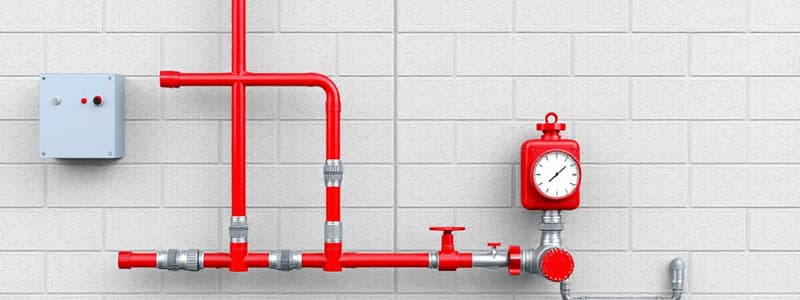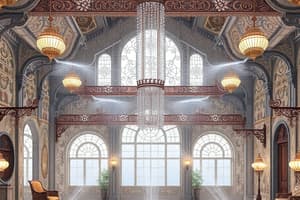Podcast
Questions and Answers
A museum is a typical example of a(n)_______________ occupancy.
A museum is a typical example of a(n)_______________ occupancy.
Light Hazard
A machine shop is a typical example of a(n)__________________.
A machine shop is a typical example of a(n)__________________.
Ordinary hazard, Group 2 occupancy
A building 50 feet high would have an elevation pressure loss of_______________.
A building 50 feet high would have an elevation pressure loss of_______________.
21.65 psi
For a room or office occupancy classified as Light Hazard, NFPA 13 limits the spacing between sprinklers to _________________.
For a room or office occupancy classified as Light Hazard, NFPA 13 limits the spacing between sprinklers to _________________.
For dry pipe systems and double interlock preaction systems, what shall the area of sprinkler operation be increased by?
For dry pipe systems and double interlock preaction systems, what shall the area of sprinkler operation be increased by?
If a sprinkler system is scheduled, this means that the maximum allowable spacing per sprinkler is ________________.
If a sprinkler system is scheduled, this means that the maximum allowable spacing per sprinkler is ________________.
If the ordinary hazard density is 0.15 gpm/ft² and the area of coverage is 400 sq ft, the minimum flow is_____________.
If the ordinary hazard density is 0.15 gpm/ft² and the area of coverage is 400 sq ft, the minimum flow is_____________.
Pipe schedule systems are permitted to be used with ____________ configuration(s).
Pipe schedule systems are permitted to be used with ____________ configuration(s).
The area/density method is used in determining the area of operation for __________ sprinklers.
The area/density method is used in determining the area of operation for __________ sprinklers.
The density selected for areas of sprinkler operation (design areas) of less than 1500 ft² in light and ordinary hazard occupancies shall be.
The density selected for areas of sprinkler operation (design areas) of less than 1500 ft² in light and ordinary hazard occupancies shall be.
What is the hose stream duration requirement for a hydraulically calculated Ordinary Hazard system where the sprinkler system waterflow alarm device(s) and supervisory device(s) are electrically supervised?
What is the hose stream duration requirement for a hydraulically calculated Ordinary Hazard system where the sprinkler system waterflow alarm device(s) and supervisory device(s) are electrically supervised?
What is the minimum duration for the water supply to a new pipe schedule system that is less than 5000 sq ft in area and has the waterflow devices constantly monitored?
What is the minimum duration for the water supply to a new pipe schedule system that is less than 5000 sq ft in area and has the waterflow devices constantly monitored?
What is the minimum duration for the water supply to a new pipe schedule system that is less than 5000 sq ft in area and has the waterflow devices are NOT constantly monitored?
What is the minimum duration for the water supply to a new pipe schedule system that is less than 5000 sq ft in area and has the waterflow devices are NOT constantly monitored?
What is the pressure loss associated with elevation?
What is the pressure loss associated with elevation?
What shall be the minimum required residual pressure for a new light hazard pipe schedule sprinkler system that has a total area of 4500 sq feet?
What shall be the minimum required residual pressure for a new light hazard pipe schedule sprinkler system that has a total area of 4500 sq feet?
Where listed quick-response sprinklers are used throughout a system, the system area of operation is permitted to be reduced without revising the density. One of the conditions is that the ceiling height must not exceed what?
Where listed quick-response sprinklers are used throughout a system, the system area of operation is permitted to be reduced without revising the density. One of the conditions is that the ceiling height must not exceed what?
As you increase the hazard classification, density must ______________.
As you increase the hazard classification, density must ______________.
Flashcards are hidden until you start studying
Study Notes
Occupancy Classifications
- Museums are classified as Light Hazard occupancy.
- Machine shops fall under Ordinary Hazard Group 2 occupancy.
Water Supply and Pressure
- Elevation pressure loss for a building 50 feet high is approximately 21.65 psi.
- The minimum required residual pressure for a new light hazard pipe schedule system covering 4500 sq ft is 15 psi.
- Pressure loss due to elevation is calculated by multiplying the elevation in feet by 0.433 psi.
Sprinkler System Design
- NFPA 13 specifies a maximum spacing of 15 feet between sprinklers in Light Hazard occupancies.
- The area of operation for dry pipe and double interlock preaction systems can be increased by 30% without revising density.
- For scheduled sprinkler systems, the maximum allowable coverage per sprinkler is 200 sqft.
- The Ordinary Hazard density is established at 0.15 gpm/ft², requiring a minimum flow of 60 gpm for a 400 sqft area of coverage.
- Area/density method is applicable to standard spray sprinklers.
- In occupancies with operational areas less than 1500 sqft, the density must match the density of a 1500 sqft area.
Hose Stream Duration Requirements
- A hydraulically calculated Ordinary Hazard system requires a hose stream duration of 60 minutes if the waterflow alarm is monitored at an attended location.
- Minimum water supply duration for a new pipe schedule system covering less than 5000 sqft with constantly monitored devices is 30 minutes; without constant monitoring, it extends to 60 minutes.
Sprinkler System Configuration
- Pipe schedule systems are permitted to be used only with tree configurations.
- Quick-response sprinklers allow for a reduction in the system area of operation, provided the ceiling height does not exceed 20 feet.
Design Density Considerations
- As the hazard classification increases, the required density for sprinklers must also increase.
Studying That Suits You
Use AI to generate personalized quizzes and flashcards to suit your learning preferences.




